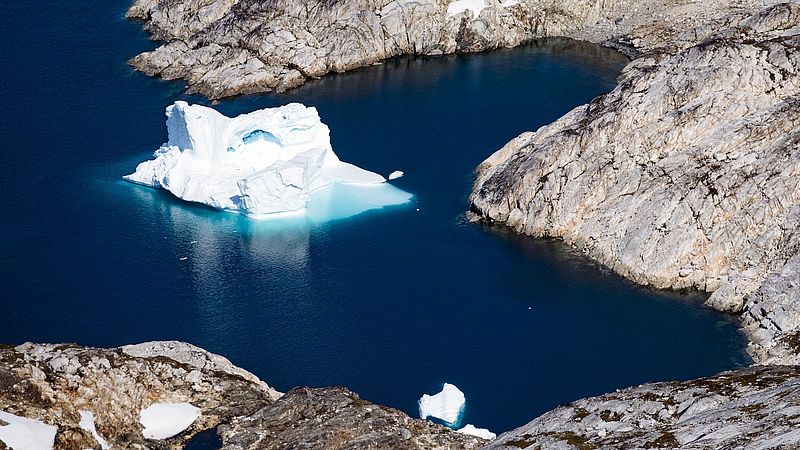This week is the first climate summit focusing on the North and South Poles. Polar researcher Martin Lunin is at this summit and hopes the message to politicians is clear. “We can talk, but they have to make decisions.”
During the climate summit, called “One Planet – Polar Summit,” scientists from all over the world gather in Paris. Here they tell world leaders about the problems in the polar regions to convince them of the need to work on solutions.
Climate change on map
Polar researcher Martin Loonen is one of the scientists in Paris on behalf of the Netherlands. He loves to be with his colleagues. “We just talked about science on the first day.” But he also knows how important this summit is. “We wrote a statement, because all kinds of government leaders are coming.”
According to Lunin, previous meetings were mainly for science, not politicians. He and his colleagues present their findings to convince politicians of the seriousness of climate change. He added, “Macron is also coming and hopes that he and other leaders can put climate change on the map.”
“Peninsulas became islands”
Lunin has been going to the Spitsbergen Archipelago every summer for 35 years to conduct research. Here he witnessed dramatic climate change: “The glaciers retreated three kilometers, the peninsulas turned into islands, and the temperature rose by six degrees.” He didn’t wear gloves for the first time this summer.
The polar researcher also believes that plants and animals are changing. “The grass is longer now, which means there are more geese. And because the winter is shorter, you see the reindeer much longer. They starve much less quickly.”
“Clearly targets politics”
“This summit is very clearly focused on policy, and that’s what also makes this summit unique,” says Lunin. “We can take it to such a high level.” He is convinced that this is the best way to put climate change on the agenda. “We can talk, but they have to make decisions.”
The polar researcher hopes that this summit will help politicians make decisions. “I stay positive,” he says. “But it will be difficult in the future, and our children and grandchildren will have to bear the burden.”
Claims in the Arctic Ocean
According to climate expert Louise van Schaik from the Clingendael Institute, the political situation in the Arctic is much more complex than in the Antarctic: “Because you have land under the Arctic Ocean that is claimed by some countries.” These areas are claimed by Russia, Canada and Denmark, among others. “Then it becomes an evolution of who he is.”
“All countries say, for example, that there is a mountain in the sea that belongs to their continent,” says Van Schaik. As a result, these countries can also claim water. According to Van Schaik, the relationship with Russia also plays a role. “The pain point is big because Russia only affects NATO countries.”
The Arctic as a gold mine
Another political hurdle is the raw materials found around the Arctic. Van Schaik: “Russia sees it as an area where a lot of oil and gas can still be extracted.” According to Van Schaik, countries such as the United States are also still interested in oil and gas in the region, which means they do not want to lose control.
Due to climate change, another source of income is also popular: fishing. “As the water gets warmer, the fish get bigger and can be found in higher places,” Van Schaik says. “This is very important for countries like Denmark and Iceland.” Each country has its own interests in the Arctic, which makes reaching settlements difficult.
“We have known for some time that things are not going well.”
Professor Michiel van den Broek has dedicated his life to climate in Poland. According to him, it is important that this summit is held now: “even if only to bring policymakers and politicians into direct contact with science.” This is believed to be the most important goal of the summit, with the hope of doing more to combat climate change. “Yesterday is better than today.”
“We have known for some time that all is not well at the poles,” says the professor. “We have been reporting on polar regions, melting ice and melting permafrost for decades.” He is not sure yet whether this summit will have much impact, because politicians already know the information. “But it’s a good sign.”
Not just the poles
The professor believes the poles are a good example of the consequences of climate change and could encourage action. “This could be a wake-up call for politicians. We cannot sit idly by and wait for sea levels to rise by three metres, by which time it will be too late.”
Van den Broek emphasizes that one should not look only at the poles. “The climate problem is global, although the poles are an important part of it.” He believes that we should not just look at one area. “You can’t solve a problem by ignoring another.”
Asks? Ask them!
Do you have any questions or would like answers? Send us a message here in the chat.

Devoted music ninja. Zombie practitioner. Pop culture aficionado. Webaholic. Communicator. Internet nerd. Certified alcohol maven. Tv buff.

